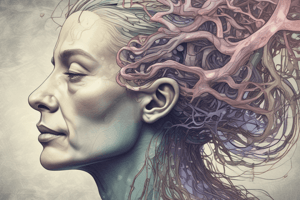Podcast
Questions and Answers
Which neurotransmitter is primarily affected in Parkinson's disease?
Which neurotransmitter is primarily affected in Parkinson's disease?
- Dopamine (correct)
- GABA
- Acetylcholine
- Serotonin
What is the main structural abnormality associated with Parkinson's disease?
What is the main structural abnormality associated with Parkinson's disease?
- Reduction in acetylcholine levels
- Progressive degeneration of neurons in the amygdala
- Loss of serotonergic neurons
- Progressive degeneration of neurons in the substantia nigra (correct)
Which group of nuclei is primarily involved in motor control and is affected in Parkinson's disease?
Which group of nuclei is primarily involved in motor control and is affected in Parkinson's disease?
- Thalamus
- Basal ganglia (correct)
- Hippocampus
- Cerebellum
What protein aggregates are found in affected neurons in Parkinson's disease?
What protein aggregates are found in affected neurons in Parkinson's disease?
Which motor symptom is characterized by slowness of movement in Parkinson's disease?
Which motor symptom is characterized by slowness of movement in Parkinson's disease?
What type of medication is commonly used to increase dopamine levels in Parkinson's disease?
What type of medication is commonly used to increase dopamine levels in Parkinson's disease?
Which region of the brain experiences progressive loss of dopamine-producing neurons in Parkinson's disease?
Which region of the brain experiences progressive loss of dopamine-producing neurons in Parkinson's disease?
What role does dopamine play in the brain affected by Parkinson's disease?
What role does dopamine play in the brain affected by Parkinson's disease?
Apart from motor symptoms, what other type of symptoms may also occur in Parkinson's disease?
Apart from motor symptoms, what other type of symptoms may also occur in Parkinson's disease?
What is the primary neurotransmitter imbalance that leads to motor symptoms in Parkinson's disease?
What is the primary neurotransmitter imbalance that leads to motor symptoms in Parkinson's disease?
Which part of the brain experiences progressive atrophy in Huntington's disease?
Which part of the brain experiences progressive atrophy in Huntington's disease?
What is the primary cause of Huntington's disease?
What is the primary cause of Huntington's disease?
Which neurotransmitter signaling pathway is dysfunctional in Huntington's disease?
Which neurotransmitter signaling pathway is dysfunctional in Huntington's disease?
What is a common clinical symptom of Huntington's disease?
What is a common clinical symptom of Huntington's disease?
What type of impairment may develop in individuals with Huntington's disease?
What type of impairment may develop in individuals with Huntington's disease?
What is a key difference between Parkinson's disease and Huntington's disease?
What is a key difference between Parkinson's disease and Huntington's disease?
What genetic factor plays a significant role in both Parkinson's and Huntington's diseases?
What genetic factor plays a significant role in both Parkinson's and Huntington's diseases?
What type of movements are characteristic of Parkinson's disease?
What type of movements are characteristic of Parkinson's disease?
What type of neurons are primarily lost in Huntington's disease?
What type of neurons are primarily lost in Huntington's disease?
What is a common psychiatric symptom associated with Huntington's disease?
What is a common psychiatric symptom associated with Huntington's disease?
What type of protein aggregates are formed in Huntington's disease?
What type of protein aggregates are formed in Huntington's disease?
Flashcards are hidden until you start studying



